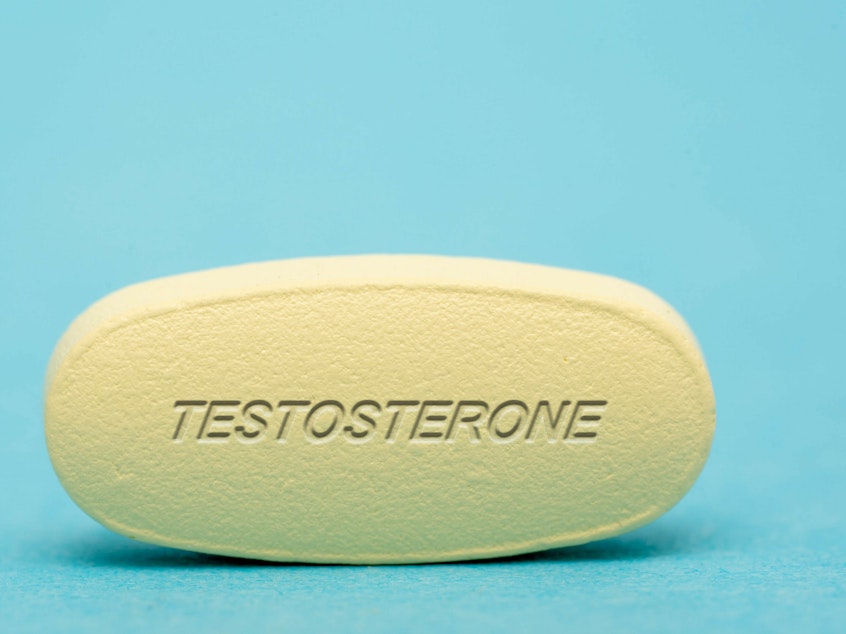Testosterone is probably safe for your heart. But it can't stop 'manopause'

In 2014 Time magazine ran a cover story titled Manopause?!, documenting the rise of the $2 billion testosterone industry, which marketed the hormone as a way to fend off age-related declines in sexual function, energy and strength.
As interest soared, so too did questions about safety. A small study showed testosterone could improve muscle strength in older men, but it also found something unexpected: a higher rate of adverse cardiovascular events such as heart attacks. In 2015 the FDA required manufacturers to add warning labels to inform consumers about the potential risks. Use of prescription testosterone started to decline.
Now a new study out Friday may ease the minds of people interested in the treatment. It finds that men who had low levels of testosterone, and were given prescription testosterone gel to increase the level of the sex hormone, did not have a higher rate of heart attacks or strokes, compared to men who took a placebo.
"The results of this study provide reassuring and substantial evidence that testosterone replacement therapy does not appreciably increase the risk of death from cardiovascular causes when appropriately prescribed," says study author, Dr. Michael Lincoff of the Cleveland Clinic. The results are published in the New England Journal of Medicine.
(This study did not evaluate over-the-counter dietary supplements that contain testosterone which are not regulated like drugs.)
Sponsored
The new study is aimed at better understanding the effects of testosterone on cardiovascular risks, explains senior study author Dr. Steven Nissen, a cardiologist at Cleveland Clinic. Yet, he interprets the results with caution.
"Although the trial showed some evidence that testosterone treatment may be safe for men with low levels of testosterone, these findings should not be used as a justification for widespread prescription," Nissen says.
The FDA says the treatment should be reserved for men with low testosterone confirmed by laboratory tests. Nissen says he's "concerned" that the results could be interpreted by bodybuilders and athletes, looking to improve performance, as a green light to use testosterone. "I really think that's a potential risk," Nissen says.
Nissen emphasizes that all the participants had preexisting or a high risk of cardiovascular disease as well as symptoms of hypogonadism, a medical term for not producing enough testosterone. The study included about 5,200 men, ranging in age from 45 to 80, who were assigned to use either a placebo gel or a testosterone gel, which is rubbed into the skin, daily for 22 months.
Among the men using the testosterone gel, 7% had a major cardiac event, such as a heart attack or stroke. Among those using the placebo, 7.3% had a major cardiac event. And, given that all the participants were at high risk of heart problems, the results suggest that testosterone does not raise the risk. As reassuring as this may be, Nissen points to other safety concerns picked up during the study, including an increased risk of heart arrhythmias in men taking testosterone.
Sponsored
"We didn't expect that," Nissen says. In addition, there were small increases in the risk of kidney injury and pulmonary embolism. The study authors conclude that the findings "support current guidelines that testosterone should be used with caution" in men who have had a previous blood clot event.
The study was funded by a group of testosterone manufacturers including AbbVie, maker of Androgel, which was the product used in the study. Common side effects and risks associated with the product are included in marketing material, including a possible increased risk of prostate cancer. In the new study, prostate cancer occurred in 12 patients (0.5%) and in the testosterone group compared to 11 patients (0.4%) in the placebo group. The trial was independently run by the Cleveland Clinic Coordinating Center for Clinical Research.
The new study results are "very encouraging," says Dr. Kambiz Tajkarimi, a board certified urologist in the Washington, D.C., area, who treats people with sexual dysfunction. He prescribes testosterone, including pellets marketed as bioidentical hormone replacement therapy, to many of his patients, and says he uses them himself.
"I was so tired," says Tajkarimi, who is in his early 50s. Now, he says he has more energy, which he attributes to the testosterone pellets. "I think this is a truly beneficial treatment."
But, clinical trials of testosterone point to modest, or even unnoticeable symptom relief, or benefits of testosterone replacement therapy. Dr. Steven Woloshin of the Dartmouth Institute for Health Policy & Clinical Practice, says one of the important findings from the new study is that about 60% of the men in the clinical trial stopped taking testosterone during the trial. Many said their symptoms persisted.
Sponsored
"That's just another way of saying it didn't work or didn't work enough for [men] to notice a benefit," Woloshin says.
Prior research, including a study published in 2016 showed testosterone led to improvements in sexual function and mood among men aged 65 and older, but a close look at prior research shows very modest benefits, Woloshin says. For instance, a 0.6 point improvement on a 13 point scale of sexual function, and 0.5 point improvement on a 45 point mood scale, "an effect unlikely to be noticeable by many men," Woloshin says. In addition, there were no improvements in fatigue.
Big picture, Woloshin says, he too is concerned that the study findings could revive interest in testosterone replacement therapy, among people who may not stand to benefit. "It's not the fountain of youth," Woloshin says. "You're going to feel the effects of aging."
Nissen agrees. "Men want to feel like they did when they were young," he says. But, of course, we can't turn back the clock. [Copyright 2023 NPR]

